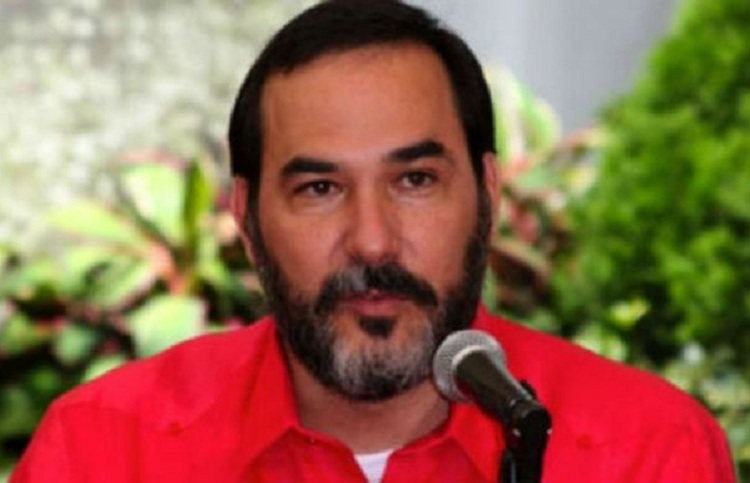The Diplomat
The Spanish Government summoned yesterday to the Ministry of Foreign Affairs the Venezuelan Chargé d’Affaires in Madrid, Mauricio Rodríguez Gelferstein, to express its displeasure for the words of the Venezuelan President, Nicolás Maduro, who last Saturday assured to have given the order to review the relations of his country with Spain.
A Foreign Ministry spokesperson informed The Diplomat that the State Secretary for Foreign Affairs and for Ibero-America and the Caribbean, Cristina Gallach, met yesterday morning “on her own initiative” with the representative in Spain. The two countries maintain their relations at the level of Chargé d’Affaires and not ambassadors, since last October when the then Spanish ambassador, Jesús Silva, was dismissed from his post in Caracas and the Venezuelan ambassador in Madrid, Mario Isea, also left his post.
The Foreign Affairs spokesman said that the reason for the meeting with Rodríguez Gelferstein was to convey the “disappointment” of the Spanish Executive for the expulsion of the European Union delegate in Caracas, Isabel Brilhante, decided last week and which was consummated yesterday, in protest for the latest sanctions adopted by the EU-27 against Bolivarian leaders. In a communiqué, Spain had already rejected the declaration of the European delegate as “persona non grata”.
Gallach conveyed to the Venezuelan representative -added the spokesman- that actions such as this expulsion or the declarations of Nicolás Maduro “do not favor the realization of the interest of Spain and the European Union to be constructive actors in the solution of the crisis”.
Maduro was irritated last Saturday by the visit of the Minister of Foreign Affairs, Arancha González Laya, to the border between Colombia and Venezuela to inquire about the situation of Venezuelan refugees and express his support to the actions of the Colombian authorities to address this problem.
The Venezuelan president affirmed that González Laya supports “Colombia’s xenophobic policy against Venezuela” and said: “We are going to respond forcefully against any aggression that comes, whether by word, action, diplomatic or political”. “Whoever wants good treatment has to give respect and good treatment to Venezuela,” he added.
Maduro announced that he had ordered his foreign minister, Jorge Arreaza, to “thoroughly” review Venezuela’s relations with Spain, a threat he has already made on other occasions, but which has not had much concreteness afterwards.
The Minister of Foreign Affairs limited herself to replying to Maduro: “I have absolutely no interpretation to make on your statements. All I ask for is the same respect I offer, no more and no less”.
The Spanish government is trying at all times not to clash head-on with the regime of Nicolás Maduro and even the meeting of the State Secretary for Foreign Affairs with the Venezuelan Chargé d’Affaires has not been presented as a “convocation”, a more formal diplomatic term to express protests, but as “a meeting on its own initiative”.
PP and CS support the minister and Podemos dissociates itself from IU
PP and Ciudadanos yesterday supported the trip made by the minister and more specifically her visit to the border with Venezuela, while Podemos dissociated itself from the criticisms made by Izquierda Unida, which spoke of “provocation” and “serious diplomatic error”.
“It is good news,” said in statements to Europa Press the International Secretary of the PP, Valentina Martinez, who said she was confident that the fact that Gonzalez Laya saw firsthand the situation of Venezuelan migrants “will make him reflect and give a turn to the policy regarding Venezuela.”
Thus, he pointed out that the reaction of Maduro, who has chosen to “threaten and insult” and “try to restrict the freedom to travel and to tell the reality that Venezuelans live”, shows that the “equidistance or openness to dialogue” for which the Spanish Government was betting on is not possible. In this sense, in the opinion of Martínez, González Laya has had a “weak” and somewhat “lukewarm” reaction by limiting himself to asking for respect.
For her part, the spokesperson of Ciudadanos in the Foreign Affairs Commission of the Congress, Marta Martín, supported González Laya, defending that his visit to the Venezuelan border “is neither aggression nor provocation, but that he was doing his job”.
According to Martin, Spain should lead the joint response to “the humanitarian drama of Venezuelan refugees” by supporting its partners in the region, which are those who have taken in the bulk of them, but also “speeding up the process of resolving applications for asylum and international protection of Venezuelans in Spain”, of which only 4 percent of applications have been recognized, according to Eurostat data.
Both PP and Cs criticized the reaction of Izquierda Unida (IU) in rejecting the visit of the Minister of Foreign Affairs. On Sunday, the leader of IU and secretary general of the PCE, Enrique Santiago, called it a “provocation” or “serious diplomatic error” and argued that with it “Spain is cancelled to help a solution”.
However, Podemos dissociated itself on this occasion from its coalition partner, and its spokesperson, Isa Serra, assured that the visit of the Minister of Foreign Affairs “is not a mistake”.







